by Ada Bronowski
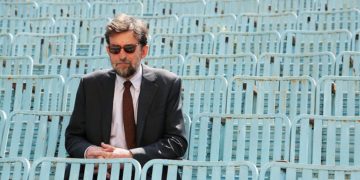 Nanni Moretti has always been a melancholic in denial. Perhaps more than any other film-director raised on the French New Wave – born in 1953, shooting his first short in 1973 – Moretti has been turning around the question that François Truffaut posed as a key to the seventh art: is cinema more important than life? But where for Truffaut, or Rossellini, as for many amongst their long and glorious lineage (from Spielberg to Tran Anh Hung) the dilemma has been between a painful reality full of obstacles on one side and a ‘harmonious’ path where ‘there are no traffic jams’ (to speak like Truffaut in his 1973 Day for Night), on the other – in other words, where cinema is the path of escape towards a world where dreams (or nightmares) come true – for Moretti, it is the dilemma itself which is the essence of cinema.
Nanni Moretti has always been a melancholic in denial. Perhaps more than any other film-director raised on the French New Wave – born in 1953, shooting his first short in 1973 – Moretti has been turning around the question that François Truffaut posed as a key to the seventh art: is cinema more important than life? But where for Truffaut, or Rossellini, as for many amongst their long and glorious lineage (from Spielberg to Tran Anh Hung) the dilemma has been between a painful reality full of obstacles on one side and a ‘harmonious’ path where ‘there are no traffic jams’ (to speak like Truffaut in his 1973 Day for Night), on the other – in other words, where cinema is the path of escape towards a world where dreams (or nightmares) come true – for Moretti, it is the dilemma itself which is the essence of cinema.
Film is a fact not a possibility. As such, the world of film-making, from its fabrication to the way “these people” are and speak is part of everyday life. In a Moretti film, it is completely normal for the characters to walk down a street and pass by a film crew setting up for a shoot, to comment on it, walk in and out of a scene. Films in the film are the norm: sometimes we see the shoot and sometimes we hear a shoot is taking place. With Moretti, what is in the frame and what is out of the frame is always arranged so as to give us the impression of mere chance: when we see in the frame first a group of high school kids plotting to occupy their school (and therefore think the occupation is the drama) in Ecce Bombo (Moretti’s second film from 1978), and then realise, because the camera moved back a little, that the older brother of one of the kids, played by Moretti himself, is staring at the group barely hidden behind the door, only to then, through a further retreat of the camera, see that Moretti’s father is standing behind him watching his son watching his sister, it is a whole new philosophy of the camera that is put in place. A philosophy whose axiom is that the unframed life is not worth living, by Socrates-the-Cameraman.
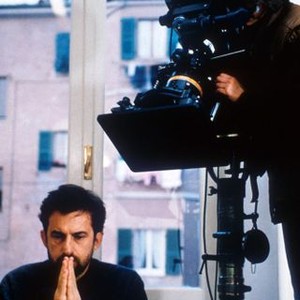 It is a philosophy which reveals the pretentions of dramatic action and the way language hijacks the very possibility of authentically communicating what we feel and want. In the scene from Ecce Bombo (a Nietzschean parody), the drama is not the occupation of the school – that is only perfunctory: doing what everyone else does – rather it is the brother’s incomprehension of his younger sister and the father’s incomprehension of his son that the camera not so much reveals (passively) as actively demonstrates through its widening of the frame. This new philosophy of the camera is a philosophy Moretti has cultivated in his cinema, from behind and in front of the camera, with an idiosyncrasy which makes him one of the last Mohicans in a film world which is dominated by the opposition between realism and special effects.
It is a philosophy which reveals the pretentions of dramatic action and the way language hijacks the very possibility of authentically communicating what we feel and want. In the scene from Ecce Bombo (a Nietzschean parody), the drama is not the occupation of the school – that is only perfunctory: doing what everyone else does – rather it is the brother’s incomprehension of his younger sister and the father’s incomprehension of his son that the camera not so much reveals (passively) as actively demonstrates through its widening of the frame. This new philosophy of the camera is a philosophy Moretti has cultivated in his cinema, from behind and in front of the camera, with an idiosyncrasy which makes him one of the last Mohicans in a film world which is dominated by the opposition between realism and special effects.
Idiosyncrasy is the word that captures more than mere originality; it designates also a stubbornness and absolute fidelity to one’s convictions of how to be, how to do the things that one does. ‘Why shouldn’t I be aggressive!’ says Michele – Moretti’s early alter ego in Ecce Bombo; ‘I’ve always stood by the right things and now I’m in my forties, I’m a splendid forty-something!’ says Nanni, playing himself in Dear Diary (1994). In his latest film A Brighter Tomorrow (Il Sol dell’ Avvenire), screened at the Cannes Festival in May of this year, in which he plays Giovanni, a film-director, he continues this idiosyncratic vein: here, it is the director’s refusal to submit to the requirements of potential Netflix producers (who could save his film) which is a renewed vow of non-compliance. Idiosyncrasy: integrity for those who have genius.
And Moretti has it, even if it is a kind of genius which does not glitter or throw powder in your eyes or lull you into a state of satisfaction; his is a rare and precious standpoint in these end-of-the-world times. A master of irony which, like that of Socrates, does not make you laugh out loud but rather makes you discern that the right and the good are lying in wait. They exist. And yet we all, amazingly, refuse to go towards them. Moretti’s art is to bring out the distance between what people do or say and what is in fact important and worthy. The distance is created for the eye, through a merciless, often still, camera which always lingers a little longer than we are used to from television or action films; and for the ear, through a systematic deconstruction of spoken language. Dialogues turn, not on the meanings of words but on the choice of words, which reveals in fact a total absence of meaning: the problem for example, with a young girl saying: ‘You don’t give a fuck about me!’ (‘a te non frega un cazzo di me’ for the Italianites) is not that the ‘you’ in question does not care about her, but rather how the use of a swear word gives the speaker a fake feeling of emancipation that leaves the actual words used meaningless.
In a famous, exuberant, scene from Palombella Rossa, from 1989, Moretti, playing Michele Apicella, his on-screen alter ego, has an utter melt-down in an interview with a journalist who blurts out, question after question, cliché set-phrases which drive Michele to scream and slap her. Himself, dressed in a bathrobe and a ridiculous swimming cap (in later films, Dear Diary and Aprile the cap will be replaced by a white scooter-helmet) turns the seeming violence into a burlesque scene which has a tragic undertone precisely because it marks the end of communication.
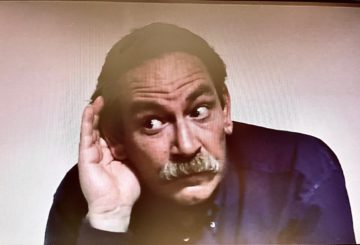
We are laughing, when we should be crying. “Words are important!”. The irony leaves no one unscathed, certainly not Moretti himself who is the first amongst his characters to carry the burden of ridicule and self-derision. That is why, like Plato’s dialogues, Moretti’s films are comedies, not because they’re funny but because everyone in them comes out lost and defeated without realising there even was a battle to fight or a path to find. That’s life, says the man with the camera. Almost a hundred years after Dziga Vertov, the truth through the eye of the camera has developed into a blurring of the eye of the camera and the eye of man. The film thinks and it is thinking about you.
Filming one’s life is as natural as breathing, and making a film out of one’s life is the only reasonable thing to do: ‘I need to work’ says Moretti, playing himself, in Dear Diary (1993), by which he means, I need to make a film of this trip. In most of his fourteen films to date, one of the characters, if not the main character, is a film-director and one, if not the main theme is how cinema impinges on life or whether it is even possible to separate life from cinema. His new film, A Brighter Tomorrow (Il Sol dell’ Avvenire), is no exception. Cinema eats at and redeems life all at once in a way which leads to the conclusion, perhaps more explicitly than in previous films, that because cinema’s intelligence is inseparable from life, we are doomed.
Moretti plays Giovanni (another alter ego, Nanni is a diminutive of Giovanni), who is a film-director, shooting a film set in 1956 about a local branch of the Italian Communist Party in a suburb of Rome, just as the Soviet tanks are about to crush the Hungarian uprising and a Hungarian circus is in town. Giovanni is having difficulties with the shoot: his actors taking the script towards a love story when it is about politics, his French producer (delightfully played by Matthieu Amalric) actually broke and living inside the film set, and his producer wife concomitantly working on another film – the kind he abhors, full of mindless violence. His personal life is in turmoil as well, though he does not realise it till the turmoil becomes clear-cut separation.
The film in the film somewhat reflects the messiness of Giovanni’s ‘real’ life, simplified to the essence: will the local head of the Italian Communist Party comply with the diktats of the Party or will he follow his heart (and his wife) in empathising with the Hungarian circus performers? It is a question which tallies with a deep interrogation which irrigates Morretti’s works from the beginning: where is the left? When, how did it go wrong?
This is the momentous and unforgettable scene from Aprile (1998) – a film which is in many small and big ways, a pendant to A Brighter Tomorrow – in which Moretti begs the head of the Socialist Party, Massimo D’Alema, through his television set to “just say something!” in front of the deleterious demagogical anti-judiciary criminal Berlusconi. The scene is as heart-wrenching and poignantly hilarious today (when we are contending with the disciples of Berlusconi who are called Trump, Netanyahou, Johnson, Bolsanaro…alas, the list goes on) as it was twenty-five years ago. 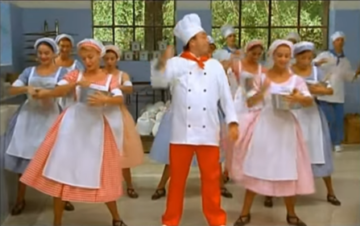 In Aprile, the birth of a son and the difficulties Moretti (as himself in the film) has with completing the documentary about Berlusconi which Aprile is about (another film inside a film) drive Nanni to drop the documentary and shoot a musical instead about a Trotskyist pastry chef (sic!). The baby and the musical are both radiant openings towards, truly, a brighter future, and a happy ending.
In Aprile, the birth of a son and the difficulties Moretti (as himself in the film) has with completing the documentary about Berlusconi which Aprile is about (another film inside a film) drive Nanni to drop the documentary and shoot a musical instead about a Trotskyist pastry chef (sic!). The baby and the musical are both radiant openings towards, truly, a brighter future, and a happy ending.
In A Brighter Tomorrow, hope is purely ironical. The Italian title: Il Sol dell’ Avvenire is taken from a line from a Soviet song, as if to drive home that all that gives us the illusion of happiness, from songs to ideologies, is poison in disguise. The musical the director was shooting in Aprile, starring the same actor, Silvio Orlando, has now become a historical drama, with Orlando as the head of the local branch of the communist party. He is set, in the film’s script, to commit suicide faced with the choice between the Party or his wife. In a last minute pirouette, the director, Giovanni/Moretti decides his character wont die after all. Instead, a huge parade made up of the actors from the historical film, but also the characters from the present including Giovanni/Moretti, his wife, his daughter and her future husband who is her father’s age, as also a host of familiar faces from previous films by Moretti, walk side by side inside a 1950s Rome towards the house of the head of the Italian Communist Party. The parade will bring about a U-turn in the Party’s line, detaching itself from the Soviets and thereby, as the last words on screen describe, have Italy become the “communist utopia imagined by Marx and Engels”.
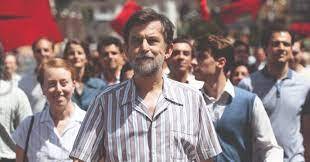 Moretti has done a Tarantino (a tarantella? – as well, as everyone starts dancing on set in a moment of suspension of anxiety, a derviche dance). But where in Tarantino, this u-chronic twist, by realising the possibilities of escape and re-enchantment of film, not only justifies the re-writing of history but also prompts our capacities to wallow in pure fantasy, with Moretti the recourse to illusion is too close to delusion and has a far greater sting attached. Past and present, fiction and politics (i.e., life), film and reality which is in fact a film, all join forces. As Giovanni/Moretti walks tall in the centre of the parade looking straight at the camera, he slowly allows for the lightest of smiles to touch his eyes and the corners of his lips – a smile which contains all the enigma of another famous smile, that of his compatriot the Mona Lisa. It is a smile that says neither happy nor sad, but where smoulders a form of wisdom which does not know what, but knows there is something we are not doing right.
Moretti has done a Tarantino (a tarantella? – as well, as everyone starts dancing on set in a moment of suspension of anxiety, a derviche dance). But where in Tarantino, this u-chronic twist, by realising the possibilities of escape and re-enchantment of film, not only justifies the re-writing of history but also prompts our capacities to wallow in pure fantasy, with Moretti the recourse to illusion is too close to delusion and has a far greater sting attached. Past and present, fiction and politics (i.e., life), film and reality which is in fact a film, all join forces. As Giovanni/Moretti walks tall in the centre of the parade looking straight at the camera, he slowly allows for the lightest of smiles to touch his eyes and the corners of his lips – a smile which contains all the enigma of another famous smile, that of his compatriot the Mona Lisa. It is a smile that says neither happy nor sad, but where smoulders a form of wisdom which does not know what, but knows there is something we are not doing right.
If cinema allows for drastic changes of plot: a couple separating can make peace and fall in love again just if the girl stays in the car, a suicide can be prevented just if the writer-director steps into the set and decides otherwise, the Italian Communist Party can cut loose from Moscow just if everyone from all the films comes together, what does it mean about our lives? The role of the director in the film is not to create escape routes but to embody the thinking conscience that accompanies the characters of the film, leading them to act in a way which is more authentically conform to their will and desires. No more mindless violence, vulgarity and cliché uses of language. Cinema is not a playground where anything is allowed, and everything can happen everywhere and anywhere. It is the space where thought can think.
In a wonderful scene, Giovanni and his wife, (who is also his producer and at that point of the film has also left him), are sitting in a meeting with Netflix executives. The executives explain how great Netflix is with its spread over 190 countries in as many languages, and its win-win narrative structure methods, epitomised by a savvily calculated “what the fuck” moment to hook the viewer. Giovanni looks at them not so much as if they came from Mars but rather as the voice of an absolutely horrific future, full of very stupid people. 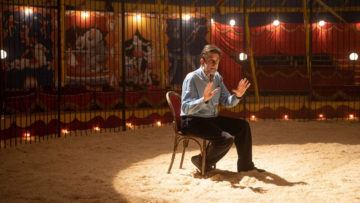 The industrialisation of the creative process is not the only target – that would be easy and a commonplace. It is the vulgarity of the words and the very idea of organising a film according to a set-plan; the very idea of satisfying a viewer’s pre-registered desires. That is impossible to stomach for our Socrates-with-a-camera. And how could it not, when he has created such a unique body of work which demonstrates the exact opposite: that the viewer cannot give orders to the film-maker because he is not in control of the frame. The director’s role is to organise the sequence of surprises which what is out of the frame reserves for what we think is in the frame.
The industrialisation of the creative process is not the only target – that would be easy and a commonplace. It is the vulgarity of the words and the very idea of organising a film according to a set-plan; the very idea of satisfying a viewer’s pre-registered desires. That is impossible to stomach for our Socrates-with-a-camera. And how could it not, when he has created such a unique body of work which demonstrates the exact opposite: that the viewer cannot give orders to the film-maker because he is not in control of the frame. The director’s role is to organise the sequence of surprises which what is out of the frame reserves for what we think is in the frame.
The ending is therefore a bitter ending despite, or perhaps because of the Leonardo-smile. It is the illusion of having won a battle when in fact the war is over.
